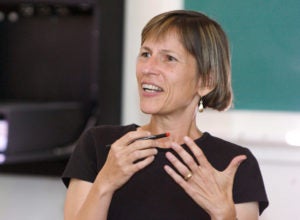Stanford faculty launch a new Humanities Core
In the 2016-17 academic year, faculty at Stanford are launching a new Humanities Core, an integrated program of courses and seminars designed to provide undergraduates with a structured and guided pathway into the humanities.
The plan is for students who fulfill the requirements of the new program to earn a Humanities Core certificate – a notation that will appear on their official transcripts.
Ultimately, the conveners of this program hope that this core sequence will constitute a new humanities minor that will have wide appeal to students across the university. (As an academic degree, a humanities minor would require approval by the Faculty Senate.)
In a joint announcement this week, Debra Satz, senior associate dean for the humanities and the arts, and Dan Edelstein, chair of the Division of Literatures, Cultures and Languages, said the new Humanities Core will introduce students to fundamental questions of human existence and to the many thinkers whose answers continue to challenge us.
“It invites students to join in that lasting conversation around these and other topics,” they said in a prepared statement. “By participating in these conversations, students will develop the mental agility to hold more than one compelling answer in their minds at once, to find their way into seemingly airtight arguments, to deepen and challenge their own commitments, and to question the very terms we use to think and argue.”
The new Humanities Core, which was developed in a consultative process that involved faculty and students, consists of four tiers:
Foundations: a foundational lecture course that leads students on an investigation of the ancient origins of world civilizations. The course will be offered in 2016-17.
Traditions: a series of parallel tracks, each of which focuses on the literary, cultural and philosophical traditions of a region, broadly construed, on a “Great Books” model. Each track will consist of a three-course sequence. Courses will primarily be offered as seminars. Current plans are to offer four tracks: East Asian, Middle Eastern, African/African-American and European. Other tracks will be added based on faculty availability and student interest. The European Traditions track will be offered in 2016-17. The other tracks will begin in 2017-18.
Disciplines: a series of introductory courses that give students the opportunity to learn more about the history and methods of specific disciplinary approaches. Some of these courses already exist, such as Introduction to the Visual Arts: History of Western Art from the Renaissance to the Present and Introduction to Philosophy.
Advanced seminars: a group of more advanced seminars that allow students to deepen their knowledge of different traditions and disciplines in departmental settings. A list of advanced seminars will be available in fall 2016.
While there are no prerequisites for any of the classes, which can theoretically be taken in any order, students are strongly encouraged to take the Foundations course during their freshman year, followed by a Traditions track during their sophomore or junior year.
In their joint statement, Satz, who is a philosophy professor, and Edelstein, who is a professor of French, wrote that designing a humanities core program is a balancing act that requires negotiating between a number of different, at times conflicting, values.
“Decisions made during this process can be controversial, and we do not claim that this program is the only possible solution,” they wrote. “What we sought to create was a program of study that encompasses the full diversity of human cultures and allows for student choice, but also ensures that students engage with the authors whose works have had an oversized influence on later generations and still resonate with us today.”
Read more in Stanford Report.

